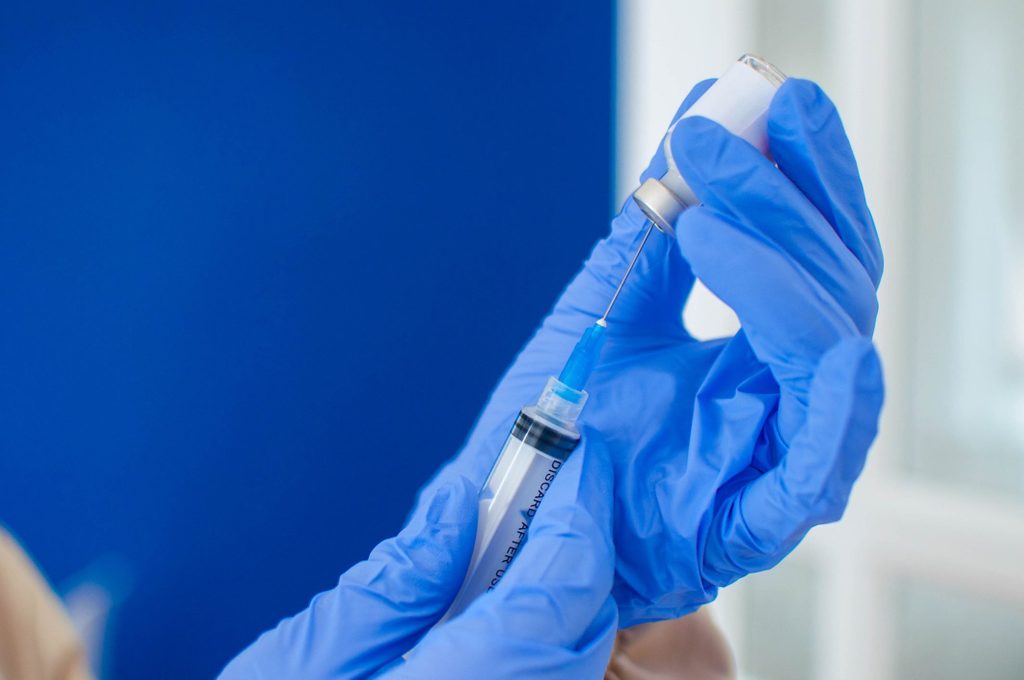How to Get the COVID-19 Vaccine at Kroger
Updated: Nov. 08, 2022

The distribution of COVID-19 vaccines is ramping up. Here's how the process works and what you need to do to get yours at a Kroger near you.
Getting the COVID-19 vaccine at Kroger
As COVID-19 cases continue to surge across the United States, health officials are urging everyone who is eligible for a COVID-19 vaccine to get one as soon as possible. All the more so because the two vaccines currently available—one from Pfizer and one from Moderna—both require two doses to become fully effective.
“The goal is for our population to develop herd immunity,” says Katherine L. Baumgarten, MD, medical director of infection control and prevention at Ochsner Health. That’s when enough people develop immunity to slow down the spread of SARS-CoV-2, the virus that causes COVID-19. When that happens, even people who couldn’t get the vaccine are protected.
Retail chains across the country will eventually be offering vaccines to the general public. Kroger, including its Little Clinics, is one of many.
Why is the vaccine important?
The COVID-19 vaccine will help protect you and those around you, especially in your community. For example, if enough people get vaccinated, this could lead to herd immunity, as previously mentioned. It’s not yet clear how many people need to be vaccinated to achieve herd immunity.
Are the vaccines effective?
Once both doses are given, the Pfizer and Moderna vaccines are each 95 percent effective. Both vaccines are messenger RNA (mRNA) vaccines and work in much the same way: They give your body instructions on how to create the coronavirus’ infamous spike protein so that your immune system will remember it and be able to fight off the real thing if you’re ever exposed.
The main difference between the two vaccines is the timing of the second dose. The second dose of the Pfizer vaccine is typically given 21 days after the first, while the Moderna doses are about 28 days apart.
Are the vaccines safe?
Vaccines, in general, are incredibly safe and the COVID-19 vaccines are no different. “You cannot get sick from the vaccine,” says Alex McDonald, MD, a practicing family physician in San Bernardino, California. “You may feel a few days of sore arm, redness at the injection site, mild fever, or fatigue. But this means your body is responding and creating the army to protect you if you do get exposed to COVID-19.”
Some people have had anaphylactic (allergic) reactions to the vaccine. Many of them had a history of such reactions. The Centers for Disease Control and Prevention has had reports of non-severe allergic reactions like hives, swelling, and wheezing. The agency recommends that people who had a reaction to the first dose skip the second dose.
Who should get the vaccine?
Other than people who’ve had allergic reactions to the first dose of the vaccine, the government is recommending that everyone over the age of 18 be inoculated. (You can get the Pfizer vaccine if you’re over 16 because the Food and Drug Administration approved it for this younger age group).
The vaccine is even more important for certain groups of people, such as those with a higher risk of being hospitalized or dying from COVID-19. The government has prioritized folks in nursing homes as well as medical workers to receive the vaccine (called Phase 1A). Next are people 75 and over or people 16 to 74 who have chronic medical conditions (Phase 1B).
In reality, each state is doing its own thing. This, along with distribution and supply glitches, means that the process can be confusing.
How do I get a vaccine at Kroger?
Kroger will be offering the vaccine to the general public at all of its 2,200 pharmacies and 220 Little Clinics nationwide. To speed up the process, the chain is also hiring 1,000 health care personnel to give shots and otherwise support the elaborate effort.
So far, Kroger has been focused on providing vaccines to healthcare workers in Alaska, Arkansas, California, Colorado, Texas, and West Virginia. It’s still ironing out the details of when it will be available in stores. The process will be similar to getting a flu shot, but you will need to have an appointment, at least in the beginning.
You won’t have to pay for the vaccine. But it will take a few minutes longer than the flu shot. That’s because the pharmacist or nurse practitioner will watch you for 15 to 30 minutes to make sure you don’t have an allergic reaction. Next, here’s how to get the COVID-19 vaccine at Walmart, CVS, and Costco.
Sources:
- The Healthy: “The new Covid-19 vaccine is here: This is what doctors need you to know”
- The Healthy: “What SARS, MERS, and Covid-19 have in common”
- The Healthy: “Here’s when the new Covid-19 vaccine will most likely reach you”
- The Healthy: Covid-19 vaccines: Moderna vs. Pfizer—what docs need you to know”
- The Healthy: “How many Covid-19 virus mutations are there?”
- The Healthy: “These people are at the highest risk from Coronavirus”
- The New England Journal of Medicine: “Safety and efficacy of the BNT162b2 m-RNA Covid-19 vaccine”
- FDA: “Moderna Covid-19 vaccine”
- Kroger: “Kroger health to provide Covid-19 vaccine nationwide”
- The Commonwealth Fund: “Federal and state policies to fill gaps in insurance coverage”
